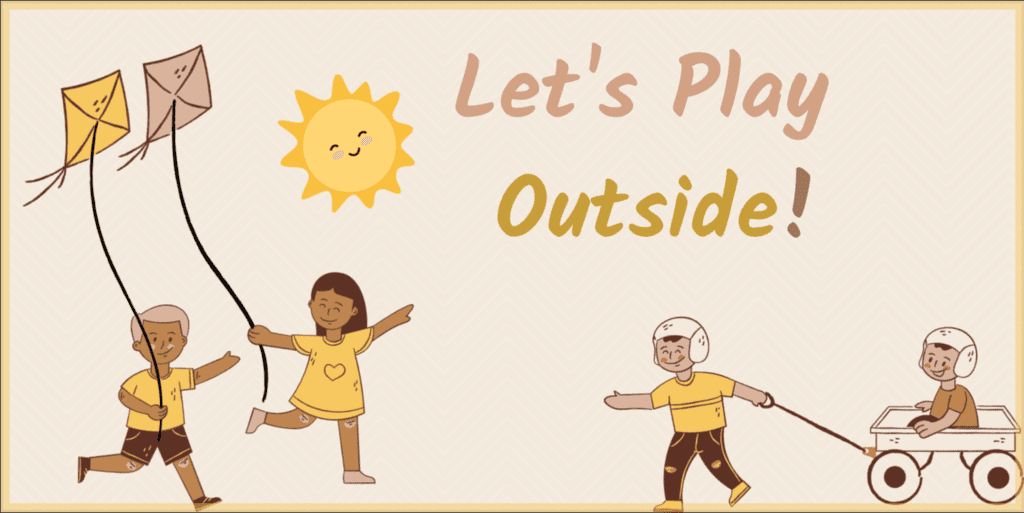The benefits of playing outside are discussed precisely in this article. Today’s children spend more time indoors than outdoors. The majority of today’s youth are fascinated by technology, including cell phones, television, and other devices. On the other hand, spending all day watching cartoons on television or talking on the phone can be harmful to their health.
Childhood obesity can also be caused by being a couch potato. On the other hand, outdoor games can help children’s mental and physical health. Their personalities can be shaped, and critical social skills can be learned through outside play. It is an excellent strategy for assisting them in learning life skills. Continue reading to learn about the benefits of allowing your children to play outside.
Children of today look at electronic devices for an average of seven hours every day. There is rising evidence that today’s adolescents prefer less physically demanding and more sedentary activities at the expense of both their quality of life and general health.
Advantages of outdoors
When children spend more time outside and away from technology, their physical health improves, developing more emotional and mental resilience. There’s no denying the benefits of getting out of the home and into the sun, whether it’s a trip to a park with a natural theme or a hike through the woods with their family.
Boosting creativity is one of the benefits of playing outside. Outdoor games may help children become more imaginative and creative. Being outside and surrounded by plants, trees, and other objects can ignite and increase a child’s imagination and creativity.
Outside play helps children develop their personalities. They improve their independence and dependability. They gain the ability to deal with crises, setbacks, and other difficulties without adult supervision. As a result, individuals acquire confidence and are better prepared to face future obstacles. Through outdoor play, they also develop skills such as discipline, sportsmanship, and leadership, which are essential in later life.
Children who play outside frequently may form enduring bonds with the environment.
More advantages of outdoors
Children who play outside tend to have a more positive attitude toward life and are more relaxed and content. Furthermore, playing outside allows children to channel their energy in constructive ways.
Improving physical fitness is included in the benefits of playing outside. Outdoor play keeps kids active and may increase their physical fitness and endurance. Their muscles and bones will be strengthened, their immune system will be strengthened, and kids will be less prone to develop diseases such as diabetes, heart disease, and obesity. They may obtain vitamin D naturally by being outside in the sunlight and fresh air. Children’s vision can deteriorate if they use electronics for an extended period. Playing outside, on the other hand, can help kids see better.
Playing outdoor games might help children’s attention spans. Outdoor games help your child’s concentration, observation, and thinking skills. Outdoor play can benefit children with ADHD (attention deficit hyperactivity disorder) by increasing their attention spans.
Outdoor games can help children strengthen their gross and fine motor skills. Outdoor activities assist youngsters in enhancing their agility, coordination, and balance.
Rewards of being outside
Children who play games together and spend time outside engage with other children more effectively than children who stay home and are withdrawn and alone. Encourage your child to go outside and interact with other kids if he or she tends to spend too much time indoors and becomes lonely. When children make new acquaintances, play alone without adult supervision, or simply chat with one another, they inadvertently learn and enhance their social and communication abilities. This ability will be useful to them in the future.
Enhancing the opportunity to learn new things is one of the benefits of playing outside. Outdoor games can considerably boost children’s learning abilities. They may acquire a foundational knowledge of science, learn to solve problems creatively, get experience interacting with the natural world, and widen their horizons as individuals. Furthermore, when youngsters study outside of the classroom, they see education as a continuous, delightful activity rather than time-consuming work that belongs in a formal setting. Outdoor sessions help students become more engaged.
Children who engage in outdoor activities are likelier to lead a balanced and healthy lifestyle as adults. They can make wise decisions. They get the ability to push themselves and challenge their boundaries, which improves their risk assessment skills.



